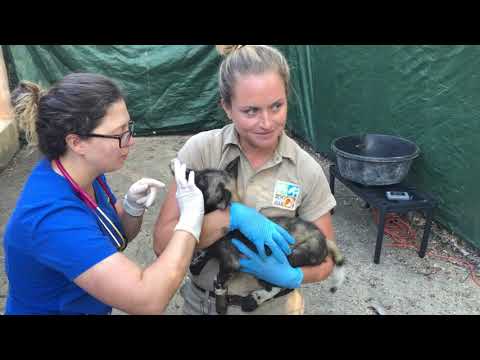Today, Zoo Miami’s newest litter of endangered African painted dogs received their follow-up 8 week exam which included getting weighed, having blood drawn and receiving vaccinations for distemper. This was only the second time that the puppies have been separated from their mother to be examined and they all did very well (though to hear them vocalize one might think differently!!). All puppies are growing quickly and are now on their exhibit with their parents daily.
With less than 6,000 individuals left in the wild, the African painted dog is one of the most endangered carnivores on the continent. Found in isolated pockets of Eastern and Southern Africa, they occur in packs that can range from 6 to over 20 individuals. They are cooperative hunters which experience one of the highest success rates of any of the major carnivores. Only the alpha pair reproduce within the pack and the female can have as many as 20 puppies which are all raised cooperatively by the other pack members. As cooperative hunters, they are able to take down prey much larger than themselves such as wildebeests and other large antelope. Other prey species include warthogs and smaller antelope such as impala and gazelles.
The largest threats to the African painted dogs are being shot by land owners who consider them a threat to their livestock, fragmented habitat, and disease transmission such as rabies and distemper that is introduced by domestic dogs.
These are the first successful births of these endangered carnivores at Zoo Miami in nearly 20 years and are a very important part of a carefully planned breeding program to help ensure the survival of these amazing animals. To celebrate these monumental births, please be on the lookout for upcoming special naming opportunities that will be announced in the Zoo News and on the zoo’s social media platforms which will allow individuals to make donations for the privilege of naming one (or the whole pack) of these precious puppies as a contribution to the legacy of wildlife.
Video: Ron Magill




